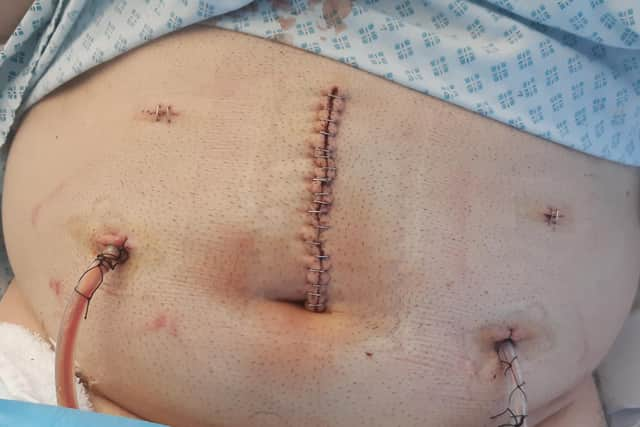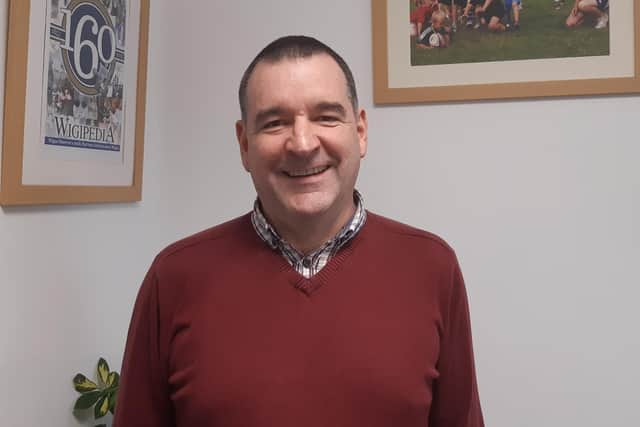How Wigan Today's editor has faced up to bowel cancer
and live on Freeview channel 276
Very silly. After all I am getting to an age when you can’t automatically expect your body to run smoothly anymore. Your 50s can be the decade of pay-back time for earlier vices too.
But my cancer diagnosis took me completely by surprise.
The year 2022 started with my wife and me catching Covid.


The illness itself affected me less than some other viral infections I’ve had and nothing compared to flu.
Advertisement
Hide AdAdvertisement
Hide AdBut during the weeks thereafter, I found myself breathless after even the slightest exercise.
Walking upstairs to the office had me catching my breath. “So this is what long Covid is like,” I thought.


I’d read enough on the subject to know it was untreatable and you just had to ride it out, so I didn’t bother the NHS about it.
A few months elapsed until I got a message from my GP saying I was due my annual check-up. Still feeling washed out and unfit, I mentioned these symptoms and the doctor suggested I a blood test which was performed on a Friday afternoon in May at the Thomas Linacre Centre.
Advertisement
Hide AdAdvertisement
Hide AdThat same evening I was settling down on the settee with a beer when the phone rang and the emergency doctor told me I should get to A&E straight away because the results showed I was chronically anaemic and had very low iron levels in my blood.
A night in casualty comprising transfusions and iron injections soon had me feeling perkier but the doctors speculated that the origin of the anaemia might be a slow internal bleed.
I’ve had gastric issues for years which once led to acid reflux splitting my oesophagus so I wondered whether there had been a recurrence.
I was sent to Leigh Infirmary for an endoscopy and colonoscopy after which the consultant swam into view in the operating theatre and rather bluntly said: “Bad news: you’ve got a bowel tumour.”
Advertisement
Hide AdAdvertisement
Hide AdUnsurprisingly I was knocked sideways. “How long has it been there?” I asked. “Judging by the size of it, I’d say about five years,” he replied. “Five years?!” I thought. “I’m done for.”
He asked if I had had any abdominal pain, unexplained weightloss, loss of appetite or change in bowel habits (the most common bowel cancer symptoms) and I answered “no” to all of them.
He did say that it could take eight to 10 years for a tumour of the large intestine to grow to full size so there was a chance it hadn’t spread. But I was sent off for a CT scan a few days later and then had the most anxious few weeks awaiting the results.
When they arrived I was told it looked like the malignant tumour had come through the bowel wall but hadn’t spread to other organs.
Advertisement
Hide AdAdvertisement
Hide AdI was sent for an operation to have half of my large intenstine removed and chunks were sent off for biopsy to see if there was any hint the odd cell might still be out there, ready to nest in some other organ.
I came round from surgery to find a big zip down my bloated abdomen and several other holes in it including two pipes draining fluids away. But the more pleasing discovery was that they had managed to complete the procedure without need for a colostomy.
As for the biopsy results: there were a few cancer cells found in the materials around the excised section so I was advised to have a three-month chemotherapy course.
I was given the option of following the conventional route for someone in my position (ie a precautionary/mopping up treatment aimed at cure) which is an intravenous infusion of a drug called oxaliplatin at the hospital every three weeks plus a complementary course of pills called capecitabine.
Advertisement
Hide AdAdvertisement
Hide AdBut I also had the chance to avoid the infusions, which can cause a condition called peripheral neuropathy that, in extreme cases, so numbs your extremities that you are no longer able to write, type or drive: not ideal for a journlist. Instead I could participate in a Royal Marsden Hospital trial trying to prove that capecitabine can do the job on its own and so help future patients avoid being overmedicated and suffer unnecessary side-effects.
I went for it and, but for cold hands and feet and the need to self-isolate for three months because my immune system was compromised, I got through to the end pretty much unscathed.
Blood samples sent to a lab in California have since returned and they detect no ctDNA (circulating tumour traces). Now I need the results of a recent CT scan to come back with equally good news and I can consider myself very fortunate. Lucky also to have had wonderful support from my wife, other family, friends and colleagues.
What caused all this will doubtless remain a moot point.
I’ve never smoked, I do drink, I did have a lot of stress five years ago and there was another bout of it in the months before diagnosis. I eat plenty of bran and enjoy my five fruit and veg a day. I wouldn’t say I over-indulged on processed meat but I have cut back since. And I should mention that my maternal grandfather was diagnosed with bowel cancer in his 40s (and survivied) and my dad’s brother died from it in his 60s from it, so I had it coming at me on both sides of the DNA tracks.
Advertisement
Hide AdAdvertisement
Hide AdI’m unusual in that I didn’t exhibit any of the classic symptoms, which is unfortunate when I’m imploring readers to look out for them. But I wish I had acted sooner when exhaustion struck.
Sticking your head in the sand when you’ve not been feeling well for ages is a bad idea.
